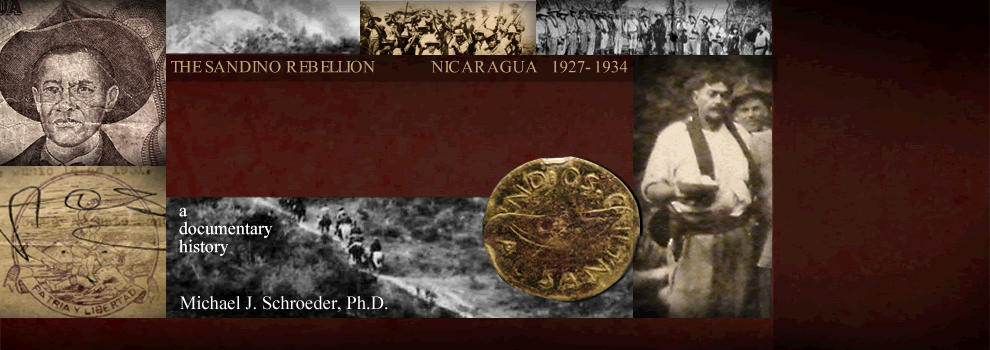|
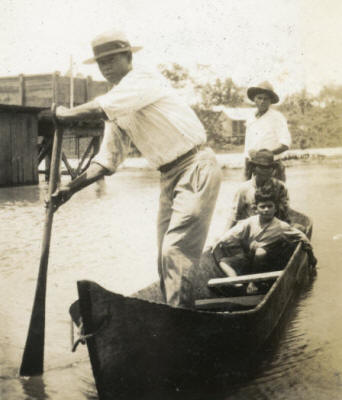 THIS IS THE THIRD PAGE OF
DOCUMENTS FOR THE FIRST HALF OF 1928
on Nicaragua's Caribbean Coast region, housing
materials dated during the 39 days from March 8 to April
15.
THIS IS THE THIRD PAGE OF
DOCUMENTS FOR THE FIRST HALF OF 1928
on Nicaragua's Caribbean Coast region, housing
materials dated during the 39 days from March 8 to April
15.
For
the first time, Sandino & Sandinismo
are beginning to make themselves
felt on the Coast. "There
appears to be an increasing feeling
in this section in favor of Sandino
and Sacasa as against Moncada,"
writes Major Utley in his report of
March 11. If Sandino were to
"enter this area . . . many
recruits . . . would be available to
him." Or, as Major Sage tells
Col. Dunlap in a personal letter of
March 14, "I have no doubt but what
Sandino has a number of adherents
here but they are very chary about
expressing themselves." On
March 27, US Consul T. M. Fisher in
Puerta Castillo, Honduras, conveys
the troubling report that mahogany
contractor Philip A. Martinez of
Cape Gracias is in cahoots with
Sandino, while closer to home in
False Bluff across the bay from
Bluefields, the initial reports on
the captured illegal arms shipment
under former Liberal General Connor
suggest the degree of mounting
Marine concern. It would be
easy to overemphasize these
concerns, however, as overall the
Marines' continue to consider that
the Coast remains "quiet."
The
first credible reports that the
Sandinistas are moving into the Pis
Pis mining districts come in early
April. A series of Sandinista
robberies of property-holders along
the Río Coco precede the assaults on
the mining properties, which begin
on April 12, with the EDSN under
General Manuel María Girón Ruano
sacking & looting & destroying the
US-owned La Luz Mine, before moving
on to the Neptune Mine on the 15th
to do the same thing (on these
events see also the
TOP 100, PAGE 9;
on Gen. Girón's capture and
execution almost a year later, see
TOP 100, PAGE 27).
The flurry of telegrams & missives
that follows bespeaks the surprise &
concern generated by the rebel
offensive and offers many important
details about local conditions and
the counterinsurgency campaign —
such as Capt. Matteson's 13 April
euphemistic assessment of Lt.
Carrol's "subnormal mentality"
(Moravian missionaries had accused
Carrol of sexually abusing
indigenous women; see Charles Hale,
Resistance & Contradiction, pp.
54-55). In the coming months,
the aftershocks of this first EDSN
offensive into the mining districts
are still rippling throughout the
northern parts of the region.
|
|
PERIOD MAPS
|
|
1894 mosquito
shore

27 MB,
library of congress
|
1920s
Standard Fruit

6.5 mb,
US National archives
|
1928 Rio wanks
Patrol

3 mb, us
national archives
|
1931 Moravian

2.4 mb,
comenius press
|
|
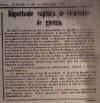
|
8 March 1928.
"Importante captura de elementos de
guerra," La Información, Bluefields [see
accompanying note of Mr. Cesar, 20 March
1928].
"El señor
Comandante del destacamento de Marines
acantonados en esta ciudad, Capitán
Donald J. Kendall, hizo una
importantísima captura de elementos de
guerra el lunes de esta semana en el
punto llamado Falso Bluff. 1
máquina marca “Browning”, 50 rifles y 5
mil tiros fue lo aprehendido. Este
armamento le fue capturado a los
liberales Naaman Connor, George Benhan y
Pedro J. Alvarado, en el momento en q’
iban a embarcarlas en un dori con
máquina de gasolina llamado “Flor de
Mayo”, en cual llevaba zarpe para el
Cabode Gracias a Dios, y a cuyo bordo
estaban los hondureños, General Luis
Alonzo López y un doctor Hernández.
Estos señores estuvieron varios días en
esta ciudad hospedados en el Hotel
Atlántico, siendo muy visitados por los
principales liberales de Bluefields.
¶ A propósito de la captura de
estas armas, vamos a dar el detalle
siguiente: ¶ La máquina que
acaba de capturar el Capitán Kendall,
fue avanzada a las fuerzas del Gobierno
en Santo Tomás, por el revolucionario
Cherry Jackson. Hay más, esta
misma máquina la tenía como trofeo de
guerra, frente a su tienda de campaña en
su campamento de Guadalupe, en Río Rama,
el Jefe de ese sector, doctor y General
Onofre Sandoval. ¶ Ahora
preguntamos nosotros, ¿para dónde iban
destinadas esas armas? ¿para donde
Sandino? Esto sólo los liberales
de Bluefields lo saben."
|
|
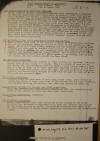
|
10 March
1928.
Intelligence
Report of Incidents,
Major A. B. Sage,
Bluefields, p. 1.
"(A) General
States of Territory occupied. ¶
Quiet. Captain Kendall, Commanding
Marines here intercepted a shipment of
arms and ammunition from False Bluff on
March 5, 1928. Four natives were
captured, the leader, a native called
General Connor, who participated in the
last revolution on the Liberal side,
engineered the move. It is my
opinion that he intended to move the
arms up the coast to the vicinity of
Cape Gracias where they would have been
available for disposal to the highest
bidder, either Nicaraguan or Honduran.
The Liberal leaders here disclaim any
connection with the affair and it would
seem logical that at this particular
time any such move would be avoided.
Connor led a band of creoles in the last
affair and is very popular with that
class of people here. The Tulsa
guard and a detachment of the 51st Co.,
under Major Utley remain at Puerto
Cabezas. Reports received from
there show everything quiet. ¶
(B) Attitude of
the civil population toward the Guardia.
¶ Very cordial. Many more of
the leading citizens of both parties
have been met and the sentiment seems to
be much in favor of the Guardia on this
Coast. As in all former cases,
however, all our moves are regarded with
interest and note made of whether this
is to be an organization like the former
force or whether it will be really under
the control of American officers and
partisan and non-political. The
attitude of the press here is favorable.
They have all given space to our arrival
and our aims and mission. No unfavorable
comment has been noted. ¶
(C) Economic
conditions. ¶ The
Bragmans Bluff Lumber Company is still
looking for laborers. The fruit
season here is now coming to a close.
There is plenty of work for all who
desire it. The merchants here all
report a poor season however, this may
be a cry of wolf, as no firms have been
reported as going to the wall.
Prices of foodstuffs remain about the
same. The meat here is of very
poor quality, the cattle being brought
in here from the nearby cays and up the
river and are generally poor. ¶
(D) Police
operations. ¶ Careful
study has been made of the local police
force, their method of operation, hours
of duty, etc. Most of the arrests are
for minor offenses, the Marines handling
the serious ones involving capture of
arms, etc. ¶ (E)
Friction between
the Guardia and Civil population.
¶ None. The officers are
familiarizing themselves with the
occupations and names of the leading
citizens and with local conditions.
¶ (F)
Military operations.
(GUARDIA) ¶ None. ¶
(G) Political situation. ¶
Quiet. Considerable doubt here
exists as to the passage of the McCoy
election law. Interest is expressed as
to just what methods will be used by our
forces in such an event. The
general sentiment here seems to be for
the nomination of Carlos Cuadro Passos
for President of the Conservative ticket
. . ."
|
|
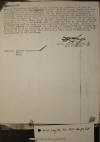
|
10 March
1928.
Intelligence
Report of Incidents,
Major A. B. Sage,
Bluefields, p. 2.
" . . . (H)
Miscellaneous.
¶ Work is progressing favorably on
the barracks and grounds to be used as a
recruit depot and training center.
Cots and locker boxes have been
completed and are in the barracks.
Galley equipment and stores are being
assembled. Regulations and routine
for the Depot have been promulgated.
Wednesday, March 16, should see the
barracks completed and recruiting will
be started on March 15, 1928. It
is hoped to enlist between ten and
twenty men within the first week, should
weather conditions permit and the
training progress favorably it is
planned that a detail for duty as the
police force of Bluefields will be ready
to take over about April 14, 1928.
As soon as the first details of
enlistment and training are inaugurated
and running satisfactorily it is my
intention to start for the interior,
making short tips of three or four days
each, this both with a view toward
recruiting and reconnaissance of the
territory. ¶ A. B. Sage.
¶ Major, Guardia Nacional. ¶
Area Commander."
|
|
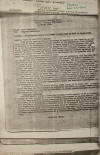
|
11 March
1928.
Intelligence
Report from 0000 3 March 1928 to 2400 10
March 1928, Major H. H. Utley,
Puerto Cabezas.
"GENERAL STATE OF
TERRITORY OCCUPIED. ¶ Calm
on the surface with no uprisings or
operations but there is an undercurrent
of unrest among a certain portion of the
population. This feeling is
believed to be festered by doubts of
there being a fair election this year.
As by far the greater portion of the
people in this area are Liberals, and
firmly believe that a fair election will
result in a Liberal victory, and that
victory by force of arms was within
their group when the Stimson agreement
was made, any failure to hold the
election or any report that no election
will be held, has an unfavorable
reaction at once. ¶ A plot
was discovered to transfer arms and
ammunition that had been hidden during
the late revolution, either to the
vicinity of PUERTO CABEZAS, to HONDURAS,
or via one of these localities to
Sandino. The plan was frustrated
at least in part by the prompt action of
Captain Kendall at BLUEFIELDS, who with
a mounted patrol captured some of the
conspirators, a machine gun, sixty four
rifles, and several thousand rounds of
ammunition. The boat that was to
take off the stores did not come close
enough to be captured. She was
reported as being off KING KEY the night
of the ninth-tenth, and request was made
on the Senior Officer Present Afloat to
seize her. At the time the request
was made the TULSA en route for this
port and it was understood she was south
of KING KEY. This proved incorrect
as she was sighted a few minutes after
the message was sent. Owing to the
shallow water it was considered
impracticable for the GALVESTON to
effect the seizure and any unsuccessful
attempt was considered undesirable from
the standpoint of morale. ¶
A patrol was sent to BUCBUC via the
WANKS river. It is still out.
A second patrol was sent via WAWA
CENTRAL to SACKLIN to establish an
outpost there during the time the first
patrol was up the river. A patrol
previously sent to the PIS PIS section
is still out. ¶
POLITICAL
SITUATION. ¶ From all
reports received from this vicinity
there appears to be an increasing
feeling in this section in favor of
Sandino and Sacasa as against Moncada.
This may have been caused by recent
rumors of the intention of Sandino to
come into this area, or by propaganda
from Sacasa who is reported to be in
GUATEMALA CITY plotting a revolution in
HONDURAS which it is proposed shall ally
itself with Sandino and after sweeping
the east coast of HONDURAS, enter this
area. There appears to be no doubt
that if such an attempt were made, many
recruits and such supplies as could be
secured would be available for him.
There are increasingly frequent rumors
of the probability of a revolution in
HONDURAS in the near future. ¶
Harold H. Utley."
|
|
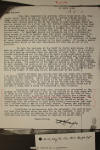
|
14 March
1928.
Letter to "My
Dear Colonel" from
Major A. B. Sage,
Bluefields.
"Dear
Colonel, ¶ This will
supplement my personal letter dated
March 3rd. This letter should
leave by mail tomorrow and if carried
through without delay should arrive at
Managua about March 23rd. I am
informed that a Marine mail courier goes
as far as San Carlos on Lake Nicaragua
where the mail is turned over to a river
boat for further transportation to San
Juan del Norte where it is again
transferred to a schooner coming up the
coast. If it develops that mail is
going astray I believe that it will be a
desirable scheme to send a courier form
here to the lake to deliver and receive
mail. If important papers and documents
are to be continually going astray it
will be readily seen that great
confusion will result in the keeping of
records and the correct handling of
correspondence. The matter of
sending mail by the way of the Canal is
out of the question. It takes at
least three weeks and is handled by too
many people. Of course a weekly
plane service would be the most
desirable by that may be out of the
question. ¶ We have the
barracks at Bluff in fairly good shape.
It will make an excellent recruit depot
and training center and will be a
location that will make an excellent
base for patrols to leave from.
There are no outside distractions and
the men will be under close supervision
at all times. I have lined up
about fifteen men for enlistment and
contemplate fitting them out and
swearing them in tomorrow the 15th.
We will probably take only about five or
six a day for the present as we must
organize as we go along. The
question of the mess is giving us
considerable thought. We will
probably run quite a bit in the hole at
the start but should pull up after
experience in handling the foods used
here. The old reliable rice and
beans are not thought so much of here as
a diet and of course it will have a bad
effect if our mess is not satisfactory
at the start. ¶ Captain
Matteson has arrived here and has taken
over command. I am fairly well
acquainted and our relations should be
the same as under Captain Kendall.
Major Utley and our relations should be
the same as under Captain Kendall. Major
Utley remains at Bragmans Bluff and will
probably make it his C.P., as it seems
to be the center of activities. I
plan to make a trip there as soon as we
are settled down and the Depot running
satisfactorily. I believe we can
get some recruits there and at any rate
I shall make a study of condition in
that vicinity. ¶ Conditions
continue quiet here, everybody is
interested in the passage of the McCoy
law and in case of its failure as to
what steps will be taken by our forces.
The news of the engagement on the 28ith
of Feb., came as quite a shock, I have
no doubt but what Sandino has a number
of adherents here but they are very
chary about expressing themselves.
The Liberal leaders here have very
definitely gone on record as having no
connection with the movement of arms
which Kendall intercepted last week and
I believe that it was an individual
affair. Connor, who engineered the
deal was probably figuring on selling
the lot to the highest bidder. ¶
Everything is satisfactory with the
personnel, the lack of mail and news
from Managua being the only fly in the
ointment. I hope to be able to
give you some information in my next
letter on the type of recruits here and
the final chances of reaching the quota
fixed. ¶ Respectfully,
¶ A.B. Sage."
|
|
_small.jpg)
|
15 March
1928.
"En nuevo
servicio radiográfico,"
La Noticia,
Managua.
|
|
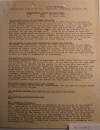
|
18 March
1928.
Intelligence
Report of Incidents,
Major A. B. Sage,
Bluefields.
"(A)
General State of
Territory Occupied. ¶
Quiet. The conservatives here are
trying to make political capital out of
the seizure of arms at False Bluff on
March 5, 1928, attributing the affair to
the leaders of the Liberal Party here.
This has been vigorously denied by the
Liberals who state that the move was a
personal matter by the leader, General
Connor, and that he was planning to sell
the arms for his own personal gain.
There is no evidence to show that any
other people were implicated and it
appears that this is the correct
solution of the matter. Captain
Kendall of the detail here made a
surprise patrol to Rio Grande Bard up
the coast on a report that there was to
be another shipment of arms but found
nothing out of the way. ¶
(B) Attitude of
the Civil Population toward the Guardia.
¶ Favorable. No unfavorable
comment has been heard or noted in the
press. A report was received by me
that there was comment to the effect
that we intended to draw a color line in
the Guardia. This could not be
traced down but to offset any such
rumour I have let it be known that the
qualification is citizenship, health and
willingness to take the oath and that we
have no lines of demarcation in
complexion. ¶ (C)
Economic
Conditions. ¶
Favorable. There is plenty of
employment on this coast. The
Fruit and Mahogany Companies are in the
field for men. It has been dry for
the past week and according to reports
the dry season is now on and will last
until about May. This is the best
season for hauling out mahogany and they
will be working at full capacity.
The season will be finished as soon as
the rains start. This is different
from the fruit season as there is a lull
during the dry season. There is a
great difference also between the
different classes of labor. The
black element being satisfied to work a
week or two, accumulate a few dollars
and lay off until it is spent while the
natives from the interior work right
through the season. Prices of
foodstuffs remain high and the market
has very little to offer. ¶
(D) Police
Operations. (Civil and
Marine) ¶ Ordinary arrests
for loitering, drunkenness, etc.
No serious crimes reported during period
covered. ¶ (E)
Friction between
the Guardia and the Civil Population.
¶ None. ¶ (F)
Military
operations, Guardia. ¶
None. ¶ (G)
Political
Situation. ¶ Quiet.
Considerable interest is manifested in
the passage of the election law.
Speculation is rife as to what move will
be made by the American Forces in the
event of the failure of the Legislation.
The platform of the Liberal Party as
adopted at Leon has been circulated here
and received very favorably by the
members of the Liberal party here.
The Conservative element, outwardly, is
in favor of the passage of the law but
in my own opinion I do not believe that
they will be unduly sorry if the act
fails in passage as they all desire to
hold their own party in power here and
in case of an impartial, supervised
election, the Liberal candidates will
undoubtedly be elected."
|
|
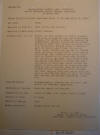
|
18 March
1928.
Weekly Report
of Events from 0000 March 11 to 2400
March 17, 1928, Major H. H. Utley,
Puerto Cabezas.
"Map used:
None. ¶ Location of outpost:
WAWA CENTRAL AND SACKLIN. ¶
Location of Main body: PUERTO CABEZAS.
¶ Patrols sent out to:
Patrol via WAWA CENTRAL TO SACKLIN
reached outpost. Its arrival a
complete surprise to inhabitants.
Captain EDSON’s patrol reached SACKLIN
at 0800 18th. Delayed by engine
trouble. Perspective arrival known
in advance. Left for BUCBUC about
1030. All quiet. 12th,
Lieut. SHEARER and one man to SASSINE
FARM, 30 miles up WAWA RIVER,
investigating condition. Cpl.
RICHARDS and patrol from WAWA to TULEDO
WAY to investigate new trail and
conditions. Returned 13th.
Outpost from BLUEFIELDS established at
GRANDE BAR 14th consisting of eight men.
Lieut. SHEARER and patrol to WAWA BAR
14th to investigate Commandante and
conditions, same day to WAWA CENTRAL –
regular inspection trip. Returned
the 16th. Captain TEBBS and patrol
from WAWA BOOM to CAPE GRACIAS 16th. by
boat, to search for arms and investigate
conditions. Still out. ¶
Duty performed: Reconnaissance,
preservation of order, and search for
arms and ammunition. ¶
Condition of trails: Detailed
report not received. ¶
Ammunition on hand: Rifle: 27,500;
M.G.: 2,250; Pistol: 5,000. ¶
Rations on hand: 23 days ¶
Health of troops: Good. ¶
Orders received: Brigade Order No.
24. ¶ HAROLD H. UTLEY,
¶ Major, U.S. Marine Corps,
¶ Commander, Eastern Area,
Nicaragua"
|
|
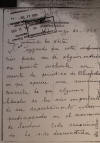
|
20 March
1928.
Note accompanying newspaper article,
from Alejandro César, Nicaraguan
Ambassador to the USA, Washington, to
Mr. White, State Dept., Washington
(817.00/5829), p. 1.
"Muy estimado Mr.
White ¶ Juzgando qu esta
información puede ser de algún intereés,
me permito incluirle un recorte de
periódico de Bluefields en que aparece
una acusación concreta de que algunos
liberales de los mas importante de ese
departamento estan participando en el
movimiento de Sandino. Esta
acusación no ha sido desmentida, . . . "
|
|
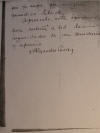
|
20 March
1928.
Note accompanying newspaper article,
from Alejandro César, Nicaraguan
Ambassador to the USA, Washington, to
Mr. White, State Dept., Washington
(817.00/5829), p. 2.
" . . . que yo
sepa, por ningún periódico liberal.
¶ Aprovecho esta oportunidad para
reiterar a Ud. las seguridades de mi
consideración y aprecio. ¶
Alejandro César"
|
|
_small.jpg)
|
23 March
1928.
"Tarífa de
mensajes al litoral Atlántico,"
La
Noticia, Managua.
"La
Tropical Radiograph Telegraph Company ha
resuelto poner en vigor la siguiente
tarifa para los radiogramas al litoral
atlántico: ¶ Por palabra por
radios a la Comarca del Cabo Gracias
C$0.35. Para El Gallo C$0.45 y
para Puerto Cabezas C$0.49. ¶
Para el gobierno se cobrarán C$0.42.
¶ Para el servicio doméstico, a
cualquiera de los cliados lugares,
C$0.15 y para el gobierno C$00.7½."
|
|
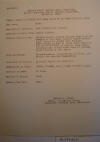
|
25 March
1928.
Weekly Report
of Events from 0000 March 18 to 2400
March 24, 1928, Major H. H. Utley,
Puerto Cabezas.
"Map used:
None. ¶ Location of
outposts: WAWA CENTRAL AND
SACKLIN. ¶ Location of main
body: PUERTO CABEZAS. ¶
Patrols sent out to: Captain
EDSON’s patrol reached WASPUC on the
evening of the 14th. Captain
TEBBS’ patrol still operating around
CAPE GRACIAS. 24th mounted patrol
to south along coast as far as
PRINZAPOLKA to observe conditions,
intercept and return armed band of
revenue agents coming up the coast.
¶ Duty performed:
Reconnaissance, preservation of order,
and search for arms and ammunition.
¶ Condition of trails:
Detailed report not received. ¶
Ammunition on hand: Rifle: 27,500; M.G.;
2,250; Pistol: 5,000. ¶ Rations on
hand: 16 days. ¶
Health of troops: Good. ¶
Orders received: None. ¶
HAROLD H. UTLEY, ¶ Major,
U.S. Marine Corps. ¶
Commander, Eastern Area, Nicaragua."
|
|
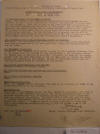
|
25 March
1928.
Intelligence
Report of Incidents,
Major A. B. Sage,
Bluefields, p. 1.
"(A)
General State of
Territory Occupied. ¶
Quiet. The action of the Congress
is adjourning without passing the new
election law has created considerable
comment. The majority of people
here who are engaged in labor are too
busy to pay much attention to politics
or the political situation and desire to
be left alone. The so called
leisure class and the office holders are
of course talking politics at all time
but outside of this small body of people
there is little interest manifested in
the coming election. The feeling
seems to be general that it will be
supervised in some manner by the
American forces and that it will be a
fair, non-partisan election and that the
Liberals will elect a president. ¶
(B) Attitude of
the Civil Population toward the Guardia.
¶ Favorable. The
installation of the Guardia as the
police force throughout this area is
considered by all as a good move toward
the stabilization of law and order.
¶ (C)
Economic Conditions. ¶
Favorable. The Bragmans Bluff
Lumber Company is still seeking
laborers. This is the season that
the cutting of logs and hauling to the
waterways starts. The Banana crop
is reported as excellent throughout the
area and the common laborer here can
make from $9.00 up for two days work in
loading the weekly banana boat leaving
for the States. Prices of
foodstuffs remain high and very little
green stuff is available in the market.
¶ (D)
Police Operations (Civil and Marine).
¶ Ordinary arrests. No serious
crimes. ¶ (E)
Friction between
the Guardia and Civil Population.
¶ None. ¶ (F)
Political
Situation. ¶ Quiet.
The various public officials here seem
to be carrying out their duties to the
satisfaction of the citizens. ¶
Miscellaneous.
¶ Recruiting is progressing
slowly. The pay, length of
enlistment, etc. seem to scare most of
the permanent population off. In all
probability most of the recruits
obtained here will be floaters passing
through here on their way from the camps
and plantations. Diligent efforts
have been made by means of personal
conversation and written publicity to
get recruits but they are coming very
slowly. A separate report is being
submitted in connection with a
recruiting and reconnaissance trip up
the Rio Grande River by the undersigned.
¶ A. B. Sage. ¶ Major,
Guardia Nacional, Area Commander . . ."
|
|
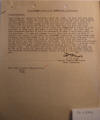
|
25 March
1928.
Intelligence
Report of Incidents,
Major A. B. Sage,
Bluefields, p. 2.
" . . .
Miscellaneous.
¶ Recruiting was opened on
Thursday, March 15, 1928. To date
five men have been enlisted. These
men were all from the interior and have
been working in the mahogany camps.
I have been informed that there are a
number of men working up in the banana
fields and mahogany camps that desire to
enlist but that until the season is over
they will not quit the work. A
number of men on the local police force
have expressed a desire to join but want
to draw their pay before quitting the
police. The next week will
determine whether it will be necessary
to send a recruiting party to the
interior. It does not appear at
this time that we will be able to
recruit any number of men from the
permanent population of Bluefields.
The floating population seems to be the
best grounds for recruiting and I have
an officer that meets all boats at the
Bluff and looks for recruits. The
Barracks has been practically complete.
The Jefe Politico has furnished all the
lumber and roofing without cost to the
Guardia, a mess has been started and the
plant should eventually develop into a
base for this entire coast. The
recruits are under close supervision at
all times and as the drill field and
maneuver ground are within a few hundred
yards of the Barracks considerable
progress should be made in turning out
suitable men. ¶ A. B. Sage.
¶ Major, Guardia Nacional. ¶
Area Commander."
|
|
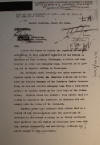
|
1.
27 March
1928.
Telegram from US
Consul T. M. Fisher,
Puerta Castillo, Honduras, to the
Secretary of State, Washington, p. 1.
"Sir: ¶
I have the honor to inform the Legation
of certain activities in this consular
district of one Philip A. Martinez of
Cape Gracias, Nicaragua, a dealer and
contractor in cedar and mahogany logs,
believed to be giving aid to General
Sandino in Nicaragua. ¶ Mr.
Martinez until recently was under
contract to Captain Byron C. Brown, an
American citizen and President and
General Manager of the Honduras Timber
Corporation, to cut and deliver mahogany
logs from a concession granted to
Captain Brown on the left bank of the
Patuca River. Captain Brown has
informed this office that recently he
cancelled the contract, as Martinez did
not comply with the terms of the
document. ¶ Captain Brown
also informed this office that as a
result of his investigation into the
operations of Martinez in the Patuca
section, he is firmly convinced that
Martinez and his family in Nicaragua
have been aiding Sandino financially and
materially, although no proof exists of
such assistance . . . "
|
|
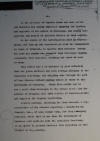
|
2.
27 March
1928.
Telegram from US
Consul T. M. Fisher,
Puerta Castillo, Honduras, to the
Secretary of State, Washington, p. 2.
" . . . In the
presence of Captain Brown and some of
his men Martinez has openly expressed
sympathy for Sandino, and approval of
his action in Nicaragua, and strong
disapproval and hatred of American
Marines in that country. ¶
In the course of the investigation made
by Captain Brown, and from my own
conversations with the Commandante de
Armas in Truxillo, it appears that
Martinez during the past six months has
smuggled from Nicaragua logging
equipment, food supplies, clothing and
about 40 head of oxen. ¶
This office has been informed by good
authority that for years Martinez has
been cutting mahogany in the Mosquito
Territory, and shipping same through the
port of Cape Gracias without paying
duties or taxes to the Government of
Honduras. About five months ago he
cut a trail from Nicaragua to the Patuca
River, for the purpose of bringing into
that section of Honduras, cattle and
supplies for logging operations. ¶
Several persons, including Mr. Hans
Bossard, a representative of the Astoria
Importing & Manufacturing Company, Inc.,
of Long Island City, New York (mahogany
concern), state that at one time the
Government of Honduras sent soldiers
into the Mosquito Territory, in an
effort to prevent Martinez from
operating in that section of the country
. . . "
|
|
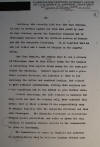
|
3.
27 March
1928.
Telegram from US
Consul T. M. Fisher,
Puerta Castillo, Honduras, to the
Secretary of State, Washington, p. 3.
" . . . Martinez,
who recently left here for Cape Gracias,
by boat to Brewers Lagoon and from that
point by foot to Cape Gracias, speaks
the Mosquito language and is thoroughly
familiar with the Northern section of
Nicaragua and the Mosquito Territory.
It is reported that he and his father
own a ranch at Saulala on the Segovia
River. ¶ One Jose
Donaire, who stated that he was a
citizen of Nicaragua, came to this
office today for the purpose of
collecting from Captain Brown money due
to work performed for Martinez.
Donaire appeared to hold a grievance
against Martinez, and informed me that
to his knowledge the latter had assisted
Sandino, but refused to give definite
information, stating that Martinez had a
bad reputation and he was afraid to give
further data. ¶ Several
Americans, who have resided in Honduras
for many years and know the country
well, have informed this office that in
their opinion it was comparatively easy
to smuggle supplies into the Mosquito
Territory and then into Nicaragua.
The Mosquito Territory is practically
without police protection, and so far as
known the only official of Honduras
located therein is the Commandante de
Armas at Caratasca. ¶ The
Commandante de Armes in Truxillo has
informed me confidentially that he
believes Sandino obtains arms . . . "
|
|
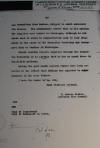
|
4.
27 March
1928.
Telegram from US
Consul T. M. Fisher,
Puerta Castillo, Honduras, to the
Secretary of State, Washington, p. 4.
" . . . and
ammunition from Mexico, shipped in small
schooners via Belize. The
Commandante stated that in his opinion
the supplies were landed in Nicaragua,
although he did state that it would be
comparatively easy to land shipments on
the coast of the Mosquito Territory and
transport them to Sandino in Nicaragua.
¶ Should Sandino receive supplies
through the Mosquito Territory it is
certain that he has an agent there to
facilitate matters. ¶ During
the past month rumors have been received
to the effect that Sandino was expected
to enter Honduras in the near future.
¶ I have the honor to be, Sir,
¶ Your obedient servant, ¶
T. Monroe Fisher, ¶ American
Vice Consul."
|
|
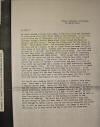
|
1.
29 March
1928.
Letter from
Capt. M. A. Edson, Puerto Cabezas, to "My
dear," USA, p. 1.
"My
Dear:- ¶ At about eleven
o’clock last night, I and five of my men
returned to this place after just three
weeks in the interior. If you will
look on some map of Nicaragua, you will
find at or near the northern border a
fairly large sized river called the
Wanks or perhaps the Coco River.
You see the Indian name for the thing is
Wanky – which means river – and some
Englishman or other named it the Coco
and as a result it has at least those
two names and probably three or four
more. Anyhow, that was our means
of travel and we went up it by boat for
a distance of 275 miles. From the
time we left here until we returned, we
traveled a total of something like nine
hundred and fifty miles. After we
got back there was talk with the major
and the two other officers here until
around three in the morning. Then
since I was not so very sleepy, I reread
the couple of letters I found here, and
part of a copy of Time which has
survived the courses of my mail and
finally reached me until nearly four. At
five thirty, such is the result of habit
formed on the trip, I awoke and have
been up ever since. It is once
again nearly eleven at night, so this
will be only a bit of a scrap of paper
for the boat leaving for the States
tomorrow morning to let you know that I
am back once more, and that a more full
and better description of the journey
will follow. ¶ You should
have seen me before I reported to the
barber this afternoon. There was a
full three weeks growth of beard, and it
was a regular one at that. Being
the “Old Man” – I overheard some of the
men calling me that among themselves the
other day – it was of course absolutely
necessary that I surpass them all in the
raising of the once necessary adjunct of
all men – a full beard. We did not take
razors on the trip because little of the
time did we want to stop long enough
after light in the morning to attend to
the function of shaving. The major
has a picture which I hope will be good
enough to give you some idea of the
thing you were unfortunate enough to
marry, and as soon as one can be
developed and printed, it will be sent
on its way rejoicing – at least it
should be rejoicing, for it will be on
its way to you and the young son . . . "
|
|
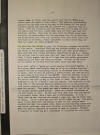
|
2.
29 March
1928.
Letter from
Capt. M. A. Edson, Puerto Cabezas, to "My
dear," USA, p. 2.
" . . .
Captain John A. Tebbs and the outfit
from the USS TULSA came ashore here the
tenth of last month. They were not
particularly pleased for the ship was on
its way to the States for its annual
overhaul period and they had all planned
for a glorious time up there. Over
two thirds of the men have been on the
ship for over two years, and the last
cruise down here for them has been for
thirteen months. They will be here until
the TULSA comes back bringing the
replacements for the men whose tour is
up, and from the appearances now, they
will probably stay here until after the
elections in November. Their
complement is only thirty two, but they
are eight men under strength now.
¶ The election law failed to pass
the Nicaraguan congress the middle of
this month. President Coolidge has
pledged himself to carry out the terms
of the Stimpson agreement made last year
which means a fair election this coming
November, supervised by the U.S. Unless
the natives come to some agreement and
pass this bill before that time, I fully
expect that we will take over the entire
government temporarily and hold the
thing ourselves. If that is the case, we
can expect to be here from now until
sometime next year. ¶ In my
last letter I wrote you about hearing
from Ralph DeWitt. I have since
heard unofficially that he is to be
relieved from his present station as
recruiting officer in Cleveland about
the first of April; that he will be
granted a months leave; and then he will
go to the ROCHESTER, relieving Captain
Frank A. Mart, who is due for relief the
last of May or the first of June.
This is quite a surprise to me as I
think I told you before. The
Rochester is the flagship of the Special
Service Squadron and it is the policy to
send senior captains to duty with her,
instead of one who has just made his
number. The guard has over a
hundred men; in fact it is the largest
Marine guard afloat. There is a
second lieutenant in the detachment as
well. He has just been sent down
from the States a Lieutenant Snead, whom
I have met in Philadelphia. In
fact I think that he went through the
school a year ago, when we first went to
Phila. He is a good man and will
be all right for me. The great
fault I will have with the detail is
that it will involve more expenditure
than the present duty. Being on
the flagship means more and better
uniforms; some cits clothing, probably,
and stepping out with the Admiral
whenever he happens to want my company.
However I consider it something of a
complement to be picked for the place .
. . "
|
|
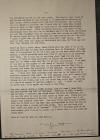
|
3.
29 March
1928.
Letter from
Capt. M. A. Edson, Puerto Cabezas, to "My
dear," USA, p. 3.
" . . . The
ROCHESTER is now on the west coast.
She usually goes there if she leaves the
Zone at all because it is much better
cruising on that coast, nearly always
calm and very few storms. Her
marines are now ashore at Corinto, but I
think she will have them aboard again as
soon as they begin to take any of the
ships detachments off this shore duty.
If the situation warrants, and there is
any probability that she will be in the
Zone much of the time, of course you and
the youngster will be coming down this
summer of next fall. So better
begin saving the shekels for new dresses
and all the rest – although I know that
you have been doing that right along.
But more of that when the thing is
definitely settled, for this may all
fall flat between now and June. ¶
There is also a rumor here, which Tebbs
gave me, that I was to be relieved and
sent to duty with aviation here in
Nicaragua. I think that if I requested
it, or if I had gone up the west coast
with the Denver, I would probably have
been able to get back as an observer
with them. But I will not do
anything about that for the time being.
I think it more advisable to finish the
sea duty and get that off my chest right
now than to go back to aviation. I
wonder if you saw in the papers of the
death of
Captain William C. Bird.
He was killed not long ago here in
Nicaragua when he flew into a buzzard
and broke the propeller of his machine.
He and his observer crashed and I think
that both were killed. I know that
Bird was. I have also been
informed that Lutz was to be taken out
of aviation sometime this year. If
that happens, that will remove the two
whom I cared least to serve within that
branch. Any of the others are all
right, and I do not think they would
pull anything for the sole reason of
getting someone in bad. I would
not care to serve under Lutz again
anywhere or any time. ¶ The
only letter which I found waiting from
you when I came back was one written the
14th of February. Previous to
that, a month ago in fact, I received
one dated about the 18th of February.
So you see the mail is more or less
mixed up right now. There was,
too, the excellent picture of Austin.
You can well imagine that I am mighty
well pleased with that. The only
thing now is that I would like you to
have your own dear self photographed so
that the two of you can go into a common
portable frame. Will you not have
yourself taken and send me it “pronto”?
Call it a birthday gift or an
anniversary gift from me to myself for I
would like it more than anything else.
¶ Lots of love to both you and
Austin, ¶ Merritt ¶
By “common” above, I mean of course “the
same”. It does not read as clearly as it
might. You would interpret it in
its right sense anyhow."
[NOTE:
The
Official List of Marine Corps Casualties
reads as follows: Capt.
William C. Byrd died in a plane
crash in Estelí on March 8, 1929.
Since Edson's letter is dated 29
March 1928, the Official List
must be off by one year. Byrd's
"Accidental Death" has therefore been
corrected to
28.03.08]
|
|
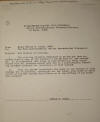
|
30 March
1928.
Non arrival
of clothing, Major H. H. Utley,
Puerto
Cabezas.
"1. The
clothing recently requested by me has
not been received although a copy of the
invoice to the QM 51st Co. has reached
me. It is understood that there is
some difficulty being experienced with
all packages mailed here due to a
misconception regarding packages
intended for individuals of this
command. ¶ 2. Will you
please investigate the delay in the
receipt of this package and if possible,
straighten out the tangle that seems to
exist either at the New Orleans Post
Office or at the offices of the
steamship company? ¶ HAROLD
H. UTLEY"
|
|
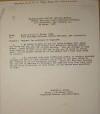
|
30 March
1928.
Request for
purchase of supplies,
Major H. H. Utley,
Puerto Cabezas.
" . . .
1. I am badly in need of two (2) pairs
leather full soles for boots and one (1)
pair rubber full soles for Spalding
tennis shoes. Local material is of
poor qu ality. Can you arrange to send
this material by mail to me and let me
pay you by check in return mail?
If not please advise me of the amount
and I will send check in advance.
¶ 2. I am informed that some
difficulty exists in sending packages
through the mail to this station, due
either to the post office at New Orleans
or to the steamship company. Since
all articles intended for the use of
Marines in Nicaragua are admitted duty
free here there should be no difficulty
on that score, if the matter were
explained to them. ¶ HAROLD
H. UTLEY, ¶ Major, U.S.
Marine Corps, ¶ Commander,
Eastern Area, Nicaragua."
|
|
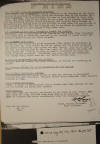
|
31 March
1928.
Intelligence
Report of Incidents,
Major A. B. Sage,
Bluefields, p. 1.
"(A)
General State of
Territory Occupied. ¶
Very Quiet. The Presidential
Decree relative to the adoption of the
supervision of elections by General
McCoy was received here by the Liberal
party with rejoicing. The
Conservatives are more or less divided
in their opinions. The great mass
of the people do not appear to be
greatly interested in the political
aspects of the situation, the majority
being Liberal in sympathies and feeling
that if the election is held under the
supervision of the American forces that
the Liberals will be installed in
government positions and they are
accordingly biding their time. ¶
(B) Attitude of
the Civil Population toward the Guardia.
¶ Favorable. The installation of
the Guardia as the police force
throughout this coast will be favorably
received by all classes of people except
the present office holders and their
friends. ¶ (C)
Economic
Conditions. ¶
Favorable. The lumber and fruit
companies offer plenty of employment of
all who seek it. This should be
the dry season and the lumber companies
may suffer considerable loss unless the
rain ceases. This is the time of
the year for hauling logs to the river
banks but the trails and roads are still
difficult. Cutting is going on
however throughout the area. The
fruit continues plentiful.
Bluefields is a poor market for
foodstuffs, very little being raised
here and very little brought here.
¶ (D)
Police Operations (Civil and Guardia)
¶ Ordinary class of arrests for
minor offenses. No Guardia yet
operating as police. ¶ (E)
Friction between
the civil population and the Guardia.
¶ None. ¶ (F)
Military
operations, Guardia. ¶
Reconnaissance and recruiting patrol to
Rama and vicinity by Lieutenant Peterson
and Cadet Bowersox. Separate
report being forwarded. Eight
recruits obtained in Rama. ¶
(G) Political
Situation. ¶ Quiet.
A number of Conservative office holders
have been shifted but this has not
created any particular comment. ¶
Miscellaneous. ¶ Nine
applicants are awaiting enlistment at
the close of this report. This
will bring the total enlisted from March
15th up to seventeen. It is hoped
to increase the number considerably
after the religious holidays. ¶
A.B. Sage ¶ Major, Guardia
Nacional. ¶ Area Commander .
. . "
|
|
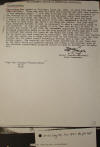
|
31 March
1928.
Intelligence
Report of Incidents,
Major A. B. Sage,
Bluefields, p. 2.
" . . .
Miscellaneous.
¶ Recruiting was opened on
Thursday, March 15, 1928. To date
five men have been enlisted. These
men were all from the interior and have
been working in the mahogany camps.
I have been informed that there are a
number of men working up in the banana
fields and mahogany camps that desire to
enlist but that until the season is over
they will not quit the work. A
number of men on the local police force
have expressed a desire to join but want
to draw their pay before quitting the
police. The next week will
determine whether it will be necessary
to send a recruiting party to the
interior. It does not appear at
this time that we will be able to
recruit any number of men from the
permanent population of Bluefields.
The floating population seems to be the
best grounds for recruiting and I have
an officer that meets all boats at the
Bluff and looks for recruits. The
Barracks have been practically
completed. The Jefe Politico has
furnished all the lumber and roofing
without cost of the Guardia, a mess has
been started and the plan should
eventually develop into a base for this
entire coast. The recruits are
under close supervision at all times and
as the drill fields and maneuver ground
are within a few hundred yards of the
barracks considerable progress should be
made in turning out suitable men.
¶ A. B. Sage. ¶ Major,
Guardia Nacional. ¶ Area
Commander."
|
|
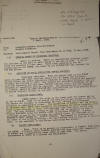
|
1 April 1928.
Intelligence
Report from 0000 March 25 to 2400 March
21, 1928, Major H. H. Utley, Puerto
Cabezas, p. 1.
"(A)
GENERAL STATE OF
TERRITORY OCCUPIED: ¶
Quiet on surface. There is
considerable movement toward the
interior on the part of small bands of
ten men or less. A few of these
are reported to have arms. These
bands apparently use two routes – one up
the WANKS, the other up the PRINZAPOLKA
and through the PIS PIS sector. ¶
(B) ATTITUDE OF
CIVIL POPULATION TOWARD MARINES:
¶ Generally favorable. When
the patrol went up the WANKS every
village was found deserted except for
old women and children. On his
return the entire population remained in
their villages and appeared friendly and
willing to talk. The Indians are
naturally friendly, and now that the
beginning has been made towards gaining
their confidence, it is believed no
opposition need be expected. The
Spaniards are not friendly as a whole,
except at CAPE GRACIAS. All
nationalities and both parties seemed to
desire frequent patrols on the part of
Marines. ¶ (C)
ECONOMIC
CONDITIONS: ¶ WANKS
RIVER: - The crops in the lower part are
scarce and up as far as ULWAS.
Some of the people are hard put to get
enough to live on. The banana bit
industry is increasing and will relieve
the economical situation to considerable
extent. The operations of SANDINO
and the decree he enforces above BOCAY
have curtailed the mahogany and balsa
industry, this years output dropping to
about 1700 mahogany logs from about
18,000 last year. The only
mahogany cutting of any size now in
operation is that of PHILLIP MARTINEZ
along the PATUKA RIVER in Southern
HONDURAS. A large percentage of
men in the territory are working either
for MARTINEZ or for BRAGMAN’S BLUFF
LUMBER CO., PUERTO CABEZAS.
Employment is uncertain and the labor of
the drifting variety, the men working
only so long as it pleases them.
In the remainder of the Sector
conditions are normal. ¶ (D)
POLICE OPERATIONS:
¶ None. There is at present to
Commandante in WASPUC, SANG SANG, and
BOCAY. A Liberal named JOAQUIN
ALVARADO has been appointed Commandante
at WASPUC and a Conservative named OBONO
at SANG SANG. The acting
Commandante at BOCAY is a Liberal and
PRO-SANDINO . . . "
|
|
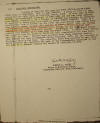
|
1 April 1928.
Intelligence
Report from 0000 March 25 to 2400 March
21, 1928, Major H. H. Utley, Puerto
Cabezas, p. 2.
"(E)
MILITARY
OPERATIONS: ¶ A group
of ten (10) men used the WAWA
CENTRAL-ULWAS-WANKS RIVER route in
September, 1927 to join SANDINO. A
group of five (5) men joined him via
this route in February, March, 1928.
In this band is MARCO AGUERRO,
Ex-Commandante (Liberal) at SANG SANG
and one man (name unknown) from BILWAY,
reported to be a Colonel of SANDINO and
possibly an occasional courier or agent
uses this trail to reach PUERTO CABEZAS.
There is a considerable flow of traffic
up the river but practically none coming
down. When SANDINO passed through
this section in March, April, 1927, he
treated the inhabitants with every
consideration, paying for all supplies
and keeping his men under excellent
control. Persistent but uninformed
rumors prevail that SANDINO is to come
down the WANKS RIVER. A report
later denied, was received that all
boats in BOCAY had been commandeered for
some movement down the river.
Reports were received from three
separate sources that SANDINO had been
in HONDURAS during February, 1928, but
had returned to Nicaragua after a few
days. His reception there was
reported as very cold, which hastened
his departure and most of the
Commandantes appointed by him are such
as to ferment trouble and should be
carefully watched. ¶ HAROLD
H. UTLEY, ¶ Major, U.S.
Marine Corps, ¶ Commander,
Eastern Area, Nicaragua."
|
|
forthcoming
|
4 April 1928
(0200).
Radiogram
from Major H. H. Utley, Puerto Cabezas,
to Gen. Feland, Managua.
|
|
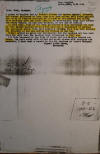
|
6 April 1928.
Radiogram
from R. Med. López, Governor, Cape
Gracias, to Pres. Díaz, Managua.
|
|
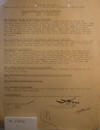
|
8 April 1928.
Intelligence
Report of Incidents,
Major A. B. Sage,
Bluefields.
"
|
|
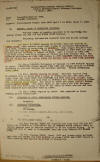
|
8 April 1928.
Intelligence
Report from 0000 April 1 to 2400 April
7, 1928, Major H. H. Utley, Puerto
Cabezas.
|
|
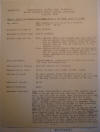
|
1.
8 April 1928.
Weekly Report
of Events from 0000 April 1 to 2400
April 7, 1928, Major H. H. Utley, Puerto
Cabezas, p. 1.
"Map used:
MAPA COMMERCIAL REPUBLICA DE NICARAGUA,
Scale 4 3/8” – 30 mi. ¶
Location of outpost: WAWA CENTRAL
¶ Location of main body: PUERTO
CABEZAS. ¶ Patrols sent out
to: 4th: - Captain TEBBS and
eighteen men left 2100 for PIS PIS
sector via ULTRAMAR to PRINZAPOLKA and
up BAMBANA RIVER towards TUNKI to
operate against band of bandits reported
to be two hundred strong. ¶
7th:- Captain EDSON, Lieut. COOK and
thirty-eight enlisted left 0400 for
BUCBUC via CAPE GRACIAS to close WASPUC
and WANKS Rivers at their junction and
operate up either at discretion. ¶
Duty performed: Reconnaissance,
preservation of order and search for
arms and ammunition. ¶
Conditions of trails: Detailed
report not received. ¶
Ammunition on hand: Rifle: 27,500;
M.G.: 2,250; Pistol: 9,000 ¶
Rations on hand: 25 days, except fresh
vegetables which are received weekly
from the States. (This does not
include 30 days rations issued to Patrol
of 58 men.) ¶ Health of
troops: Good. ¶ Orders
received: None. ¶
Messages received: 5th: Radio from
SECBRIG, MANAGUA: “Two hundred armed
bandits headed for PIS PIS. Had
very little ammunition, did not care to
fight, were looting as they went.
Bandits said they were going to PIS PIS
and PUERTO CABEZAS. Well mounted
and have two machine guns. SANCHEZ
recognized as second in command.
Stopped at LOS CARPOS, forty miles NNE
of TUMA yesterday. Information
furnished by reliable native. ¶
5th: Letter from H. CARLOS, SACKLIN: “I
beg to inform you that a day after my
arrival at WASPUC MOUTH, the news
reached there that a gang of so-called
SANDINISTAS on a raid, cleaned up
everything at AWASBILA. They
caught MULLER’s wife and made her pay
$150 ransom. He [held] up at A.
MARTINEZ at SANG SANG for cash,
provisions and clothing to amount of
$500. Left a notice at SANG SANG
they were coming back with balance of
forces and make . . . "
|
|
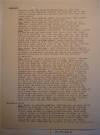
|
2.
8 April 1928.
Weekly Report
of Events from 0000 April 1 to 2400
April 7, 1928, Major H. H. Utley, Puerto
Cabezas, p. 2.
" . . . another
raid. The MOARVIAN Missionary at
SANG SANG writes to OTTO MAIZENER
warning him they are out to get him for
having taken the marines down to CAPE
with outboard motor.” ¶
6th: Radio
from ALBERTO FAGOT, CAPE GRACIAS:
“Men reported on river robbing public
authorities.” ¶
6th: Radio
from SALAZAR, Collector of Customs at
CAPE GRACIAS: “SANDINISTA forces sacked
SANG SANG and coming enroute to WASPUC
according to official advices and
reliable sources. People
abandoning their posts.” ¶
6th: Radio
from MULLER, MULLERBANK: “On March 29th
a group of twenty-one men came down from
upper river and taken $500 from MARTINEZ
and $150 from Mrs. MULLER, also cattle
and provisions and then went to
AWASIBILA and took everything CUBANO
had, including three boats. The
chief of these men named RODOLFO ALEMAN,
second MARCOS AGUERO. Had about
eight or ten rifles and some shotguns.
They said they were going to stay at the
falls to await marines and that they
expected more soldiers from up river.
¶ 6th:
Radio from Governor, CAPE GRACIAS:
A long dispatch containing no additional
information, but showing evidence
Governor is extremely worried and
earnestly desires many Marines stationed
at CAPE GRACIAS for his personal
protection. ¶
7th: Radio
from Capt. EDSON-WANKS RIVER PATROL:
“Arrived at anchorage 1130 – disembarked
at 1330. Have secured barge and
gasoline motor at $28.00 per day or
$18.00 if I furnish gasoline.
Request you send an additional fifty
cases gas and fifty gallons oil via
ESPERZO which will be in CABEZAS next
Tuesday or Wednesday, also any
additional information or messages sent
via her will be forwarded immediately by
FAGOT. No additional news here –
bandits last heard from at AWASBILA or
AWAWAS. Rumors not confirmed that
they will soon attack WASPUC.
Stories here among Bamboo Whites and
probably natives that we learned to
their coming down river and so turned
back. Governor and Customs
Official want ten men here. I
refused to leave any. No military
value here unless as a curb to gun
running in vicinity. Am leaving
with entire patrol at about 1800.
Will leave BURTON and three men at
SACKLIN with three weeks rations.
Request you send fifteen days rations
and supplies for entire patrol not later
than April 27th. My number twelve
is radio for you to be sent next
schedule with CAB from the station in
CAPE GRACIAS. Will send next
message from WASPUC via SACKLIN. ¶
Messages sent: ¶
6th: Radio
to SECBRIG MANAGUA: “Information
received today believed originated from
one source considered reliable through
four channels that party about, twenty
men with rifles were looting on WANKS
RIVER-AWASBILA; SANG SANG; WASPUC sector
at AWASBILA 29th March. Returned
up river stating they would await
enforcements at BOCAY and return EDSON,
COOK, and thirty-eight enlisted leave at
0400, 7th for BUCBUC via CAPE GRACIAS to
close WASPUC and WANKS rivers at their
junction and operate up either at
discretion . . . "
|
|
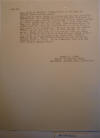
|
3.
8 April 1928.
Weekly Report
of Events from 0000 April 1 to 2400
April 7, 1928, Major H. H. Utley, Puerto
Cabezas, p. 3.
" . . .
6th: Radio
to SECBRIG: “TEBBS should be two
days up BAMBANA RIVER towards TUNKI.”
¶ 6th:
Note to Capt. TEBBS by PRINZAPOLKA and
via INGLESING: “Information form
BRIGADE-Patrol of CARATERA AREA reports
two hundred armed bandits disinclined to
give battle, mounting little ammunition,
two machine runs, forty miles NNE TUMA
4th. Headed for PIS PIS AREA.
TUMA seventy miles SSW TUNKI.
Probably using old JINOTEGA-PIS
PIS-ULWAS Trail.” ¶
7th: Radio
to CO BLUEFIELDS: “SECBRIG advises
two hundred bandits moving NNE from
vicinity TUMA towards PIS PIS Sector.
TEBBS now moving up PRINZAPOLKA RIVER on
TUNKI. If he intercepts band they
may turn towards GRANDE RIVER.” ¶
7th: Radio
to CO EL GALLO & NCO GRANDE BAR:
“SECBRIG PIS PIS Sector. TEBBS
with seventeen men now moving up BAMANA
RIVER on TUNKY. If he intercepts
band they may turn towards GRANDE
RIVER.” ¶ HAROLD H. UTLEY,
Major, ¶ U.S. Marine Corps.
¶ Commander, Eastern Area,
Nicaragua."
|
|
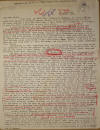
|
13 April
1928.
Letter from
Capt. C. P. Matteson, El Gallo, to Major H. H.
Utley, Puerto Cabezas, p. 1.
"My dear
Major: ¶ Fitz sent my
8613-1910 tonight – to Cabezas. He
stuck around till 9:45 PM for a possible
answer. Major, this is
characteristic of Fitz in every dealing
I have had with him. I have found
him cooperative in trying to get the
other operators to work this place.
¶ I will leave here at 5:45
tomorrow and arrive at Tungla in the PM.
I have gotten a lot of good information
from Julio Lalinda and others who are
acquainted there and with two letters of
introduction from him, I should be able
to get any info they have. The
town of Yauscatara is about 12 miles
downstream from Tungla. The
native, Urbina, whom Kendall sent up
here will go along, and will proceed to
Tebbs with information at hand and that
may be got. My return trip will be
governed as to route by info I gather.
It appears thought that Lalinda would
have heard of any disturbance there,
from some of the many men who have come
to Cruz for money and supplies for the
camps – mahogany – over there. ¶
Everything is well organized here and
Julio Monteray who has camps above Pal
Punta will be on the lookout for any
disturbance up the river as will the man
in the camps of Juan Pinada [Juan
Piñeda]. Conditions are
exceptionally quiet here, and everyone
seems most desirous of continuing with
their work. ¶ We were on the
lookout for the 5 Spaniards who came
from Bragman’s but they did not come on
the river. Johnny Williams came up
on the barge and told us, as did Johnson
by radio that they went on down the
shore. ¶ The holy week
passed off quietly. There were
three murders up river, and one here in
Gallo, in drunken brawls. We
looked the two pals of the murdered man
in the brig, who with another temporary
prisoner were delivered tonight about
8015 by someone sawing the lock off the
brig. I would have shipped the
three to Bluefields, but their escape
just save bother as there was not much
of a case against them. The two,
and the one murdered started an argument
with a harmless old fellow in camp here,
who after they had cut his wrist, took a
machete and split the head of the dead
one, the others though drunk, disarmed
him and slapped him on the head with the
machete but being drunk were not as
accurate as they should have been.
The commandante up the river where the
other killings took place arrested these
men, but subsequently turned them loose.
He wanted me to sent up and arrest them.
I told him that he was given rifles and
arms to enforce law, that I would help
him when he failed, but that he would be
expected to discharge his obligations as
a lawful representative of the
Government. He has been working
better all the time, and it appears that
if they are encouraged our work will be
minimized and a better taste will remain
all around. Cajina Commandante in
Cruz is quite a problem. I am of
the firm belief that he knows the
location of the sub Thompson but he
won’t jar loose. I have offered
$10 to three people who also believe
Cajina knows its location. One man
says positively that he saw it in the
office there. He stood before
Cajina and told me so. ¶
There is rather a serious report of
scandal in our circle in Bluefields.
I shall not report what I have heard for
you will no doubt hear it as correctly
from other sources. Johnny
Williams was my informant and Doty told
me it was in the mouth of all the men.
If you write to Kendall, I suggest that
this be not mentioned as it involves his
family. There is however, a
report, same source, that the men are
going bad there. This is meant
only to place you in a receptive mood
for other reports. Perhaps Shearer
will communicate it to you. ¶
Rather enjoyed Shearer while here.
His task was disagreeable at best.
All I have heard about Carrol’s carriage
down there so far only tend to indicate
that he is a bit subnormal mentally.
This may not be true, but it is a
protective excuse for him. ¶
Relative to the radio situation. A
good example of the difficulties in
Bluefields came again this evening –
Kendall’s 8613-1345. Fitz got it
on his overtime schedule at 2127.
Of course, this message was routine but
it is typical of others if I remember
that at one time while I was there we
had an encoded message which with the
coding and delay in getting to the staff
held it up in departure for 26 hours . .
. "
|
|
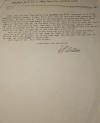
|
13 April
1928.
Letter from
Capt. C. P. Matteson, El Gallo, to Major H. H.
Utley, Puerto Cabezas, p. 2.
" . . . Fitz told
me that Bluefields told him that
messages to or from marines went, no
charge. I know for a fact that he
has sent rush messages for me direct, as
note, though if there is any knowledge
of involving him, I would prefer this
not to be mentioned. He also
stated that if he had a letter class of
receiver similar to the Navy type, he
would be able to hear the Bluff but that
he can scarcely hear them now. He
did a thorough, snappy piece of work in
putting the Bar in commission.
Talir had contended that the Bar set
could not be made to function by the
best man in the world. ¶ Have had
no trouble with my men here and
everything is going smoothly. I
have put a MG implacement on the bend in
front of the barracks, and an auto rifle
and grenade pit on the bank near the
hospital. No one here is excited
but everyone is interested. ¶
Will turn in now. Very best
wishes, ¶ Obediently and
sincerely, ¶ C.P. Mattson"
|
|
_small.jpg)
|
14 April
1928.
"Lo que es y
lo que ha hecho la United Fruit
Company," La Noticia, p. 3,
Managua, p. 1.
[NOTE: This is a fascinating piece
of pro-United Fruit propaganda,
doubtless penned and paid for as
"news".]
|
|
_small.jpg)
|
14 April
1928.
"Lo que es y
lo que ha hecho la United Fruit
Company," La Noticia, p. 3,
Managua, p. 2.
|
|
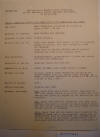
|
1.
15 April
1928.
Weekly Report
of Events from 0000 April 8 to 2400
April 14, 1928, Major H. H. Utley,
Puerto Cabezas, p. 1.
"Map
used: MAPA COMMERCIAL REPUBLICA DE
NICARAGUA. Scale 4 3/8” – 30 mi.
¶ Location of outpost: WAWA
CENTRAL AND SACKLIN. ¶
Location of main body: PUERTO
CABEZAS. ¶ Patrols sent out
to: 14th: Pack train, with support of
six (6) men, Cpl. PORTER in charge, left
WAWA CENTRAL at 1430 for SACKLIN.
¶ 10th: Part of Captain EDSON’s
patrol reached SACHLIN [SACKLIN] and
established outpost there. ¶
Duty performed: Reconnaissance,
preservation of order and search for
arms and ammunition. ¶
Condition of trails: Detailed
report not received. ¶
Ammunition on hand: Rifle: 27,500; M.G.:
2,250; Pistol: 13,000 ¶
Rations on hand: 13 days, except
fresh vegetables which are received
weekly from the States. (Not
included in above is rations furnished
to patrols of 18 men to include 14 May,
1926.) ¶ Health of troops:
Good ¶ Orders received:
Brigade Order #24. ¶
Messages received:
8th: Radio
from WANKS RIVER PATROL: “Bearings
in the motor boats taking us up river
burned last night twenty-five miles up.
Expect to get underweight this evening.”
¶ 8th:
Radio from SECBRIG: “Received from
TUMA that bandits have gone to YAUSCA to
await another force. Had very
little ammunition. The REISA Trail
between YAUSCA leading to OUILALI.”
¶ 11th:
Radio from NCO RIO GRANDE BAR:
“Received information from one of the
mosquito indians who is Conservative
that he overheard that SANDINO would be
here inside of two weeks.
Conservatives here seem much worried.
Trying to get more information.” . . . "
|
|
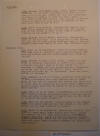
|
2.
15 April
1928.
Weekly Report
of Events from 0000 April 8 to 2400
April 14, 1928, Major H. H. Utley,
Puerto Cabezas, p. 2.
" . . .
12th:
Message from WANKS RIVER PATROL:
“Motor trouble continued up the river.
Proceeded main body in outboard motor
with Cpl. BURTON and four men.
Established outpost at SACHLIN [SACKLIN]
at 1630 this date (10th). I will
rejoin main body tonight. Will
probably establish outpost at WASPUC at
dark April 12. Message in code
will leave here within 48 hrs.” ¶
12th:
radio from SECBRIG: “Unconfirmed
reports that a band of one hundred armed
men were last seen moving east on RIO
GRANDE in small boats. Reports
stated in vicinity of RIO NEGRO on 10
April.” ¶
12th:
Message from O’CONNOR, HONDURAS:
“Everything quiet so far and there is no
indication of any trouble for next two
or three months although there is talk
of FERRERA expedition likely to come
from GUATAMALA side.” ¶
Messages sent : ¶
9th:
Radio to CO BLUEFIELDS: “SECBRIG
advises bandits from TUMA went to YAUSCA
to await reenforcements. Have arms
and machine gun but little ammunition.
Where is YAUSCA?” ¶
10th:
Message to WANKS RIVER PATROL:
“Rumors of outbreak in HONDURAS
increasing in numbers but nothing
reported at YAUSCA awaiting
reenforcments. Imperative you
block both WASPUC and WANKS at their
junction. Supplies requested will
be furnished. Your two radios and
No. 11 received.” ¶
10th:
Message to PIS PIS PATROL:
Following from KENDALL: “I have
information that JOSE ORROLICO was at
TUNKI March 30 and said he expected two
hundred men there whom he would take to
TUNGLA and arm from rifles hidden there.
SECBRIG states band went to YAUSCA to
await reenforcements eighth.” ¶
12th:
Radio to CO EL GALLO, CO BLUEFIELDS, NCO
RIO GRANDE BAR: “SECBRIG states
unconfirmed report band one hundred
armed men seen moving east in small
boats on RIO GRANDE in vicinity RIO
NEGRO 10 April.” ¶
13th:
Radio to USS DENVER: “SECBRIG
reports one hundred bandits in small
boats moving down GRANDE at RIO NEGRO
sixth. PIS PIS band encamped at
YAUSCA.” ¶
13th:
Radio to CO BLUEFIELDS, information
SECBRIG: “Report of three small
bands moving down WANKS, GRANDE and
towards PIS PIS, with press reports
surrounding SANDINO completed, support
previous estimate probably bandit
intention. Watch out for band down
KURINGWAS or ESCONDIDO next.
Report present strength and disposition
your sector.” . . . "
|
|
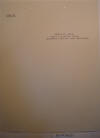
|
3.
15 April
1928.
Weekly Report
of Events from 0000 April 8 to 2400
April 14, 1928, Major H. H. Utley,
Puerto Cabezas, p. 3.
" . . . HAROLD H.
UTLEY, ¶ Major, U.S. Marine
Corps, ¶ Commander, Eastern
Area, Nicaragua."
|
|

|
15 April
1928.
Radiogram,
A.
H. Head, Neptune Mine (?), to A. E.
Ingram, Tunki.
"WE ARE EXPECTING
SANDINO IN HERE THIS AFTERNOON, AND A
BUNCH OF US ARE COMING OUT. PLEASE
HAVE BOATS UP TO CARRY 8 OR 10 PEOPLE
AND IN CASE THERE'S ANY TROUBLE AT TUNKI
BEFORE WE ARRIVE TRY TO SEND WORD UP THE
RIVER AND HAVE A SIGNAL OF SOME KIND OUT
SO WE WONT RUN INTO A TRAP."
|
|

_small.jpg)
|
15 April
1928.
Radiogram,
A.
H. Brown, La Luz Mine, to L. Elizondo &
Co., Puerto Cabezas.
|
|
|
|
|
PREVIOUS
NEXT
|
|
|
|
|
|
|
|
